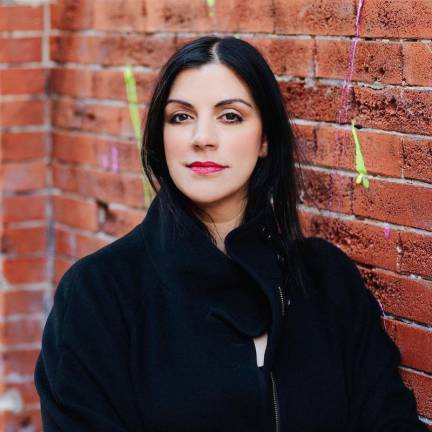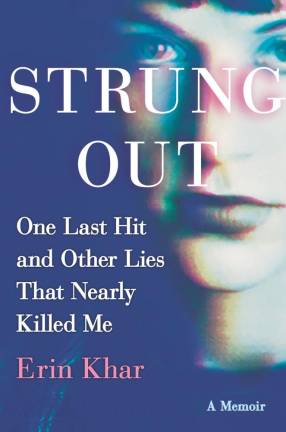Erin Khar is known for writing on addiction, recovery, mental health, relationships, parenting, infertility and self-care. Her first book, "Strung Out," reveals the struggles she faced with addiction at age thirteen in Los Angeles and how having her first child helped her get sober. As she began the process of finding an agent, selling, writing and editing her book, her Lower East Side apartment suffered major water and roof damage during a fire. Through it all, Khar managed to write an open and honest story of her fifteen-year battle with addiction. “Strung Out,” from HarperCollins/Park Row Books, comes out on February 25.
You talk a lot in the book about your opioid addiction, and I wondered what got you to a place where you felt like you could write a memoir about your experience?
When I was actually at the New School, I had a professor there say to me that she thought I had a memoir in me. As I started writing more and more about my addiction and recovery, the response from people was so overwhelming that I realized I had an opportunity to use my story to create this narrative that might actually help people. Not just help people struggling with addiction, but also help people understand addiction who may have preconceived ideas about what addition is and what addiction looks like. Doing that it helps lessen the stigma and shame around addiction. That was the driving force for me.
What made you decide to seek help and get clean?
When I found out that I was pregnant I was still using drugs, and I didn’t stop using immediately. I stopped within less than two months. But I had to find a doctor who would detox me without using methadone. And I did. And I knew that I was committed to staying off of drugs for my pregnancy, but I didn’t have faith that I’d be able to do so once the baby was born because I had fifteen years of struggling. When I talk about this story to people, it always sounds a little bit trite. But when my son was born, I just looked at the baby, who I hadn’t really felt connected to while I was pregnant. But from the moment that I first held him, just looked at him and the love that I had was just so overwhelming that I had that thought pop up in my head — I love you more than I hate myself.
That was sort of the impetus to start doing the work I needed to do so that I could stay off of drugs permanently ... I really did stop beating myself. I learned to like myself, learned to take care of myself, and learned to show myself love and compassion that I hadn’t been able to do before.
After you gave birth, did you battle with postpartum depression? Was it a difficult time when you thought you might relapse?
I was definitely concerned that I might have postpartum depression, because I had a history with depression and anxiety.But I did not, thankfully. It was really hard, but I think having him and feeling like I wanted to do this not just for me but for him, kind of pushed me to do the work. The other factor is that I had support from my family. You know, I had my parents who were supportive, that financially made it possible for me to get things like therapy. And also, they were supportive in terms of my emotional well-being at that time. You know a lot of people don’t have those things, and I always try to highlight that because, you know, I had a lot of privilege in terms of a community around me, in terms of financial privilege that I could afford to access mental health services. All of those factors.
And it was still really hard for me. So, when people don’t have those support systems in place, it’s extremely difficult to maintain any long-term sobriety. And I mention this because one of the things that’s part of my platform is advocating for government funded treatments.
What do you recommend for people struggling with addiction who don't have insurance or have insufficient insurance and can't pay out of pocket for treatments or programs that can help them?
There are options, but it’s not easy to get subsidized services. There are services through harm-reduction organizations where they can help people with medically-assisted treatment. I’m talking about for people struggling with opioid addiction. So instead of going on something like methadone, which has a whole other set of problems, they’ve been really successful helping people with Suboxone, which is an antagonist.
So that’s one thing...looking for subsidized programs that may offer medicated assisted treatment. There are 12-step recovery programs that are free. And I think, you know, one of the things, in terms of spreading the word about this, is it's not just for people that are struggling, but for the people who know people who are struggling. It’s really important that we as a community, number one, meet people where they’re at. And number two, are there [for them].
I understand that it can be frustrating when we’ve seen somebody relapse repeatedly. But helping them doesn’t mean that you have to go and enable them. But helping them means showing up to have a meal with them, picking up the phone when we need somebody to talk to. When somebody reaches out for help, I think that we were taught for a long period of time to have this tough love approach, and that doesn’t really work. You know, community is probably the number one thing that is free that we can do to support people who are in recovery.
You’ve said that communities of privilege and their addiction stories are being told, but the same is not necessarily true for people of color. Can you share how those stories could be told, or how you’re helping to change the conversation so those stories can get out?
I think that the variety of addiction stories being shared is expanding, and that’s important because it will pave the way for others to do the same. Part of what compelled me to write this memoir is that it is the book I needed when I was younger. I didn’t have a frame of reference for young, female heroin addicts who had shared their stories.
Historically, across all book genres, there has been a lack of diversity. That is changing, which is great, but we still have a long way to go. As a writer with the opportunity to share my story with a wide audience, one of my goals is to help destigmatize the topic of drug addiction. And further, I feel a responsibility to support and uplift the stories of people who face barriers that I did not — racial, financial, social, cultural. These are barriers that people struggling with addiction face, and barriers that people of color have faced in the publishing industry.
Part of what compelled me to write this memoir is that it is the book I needed when I was younger.

